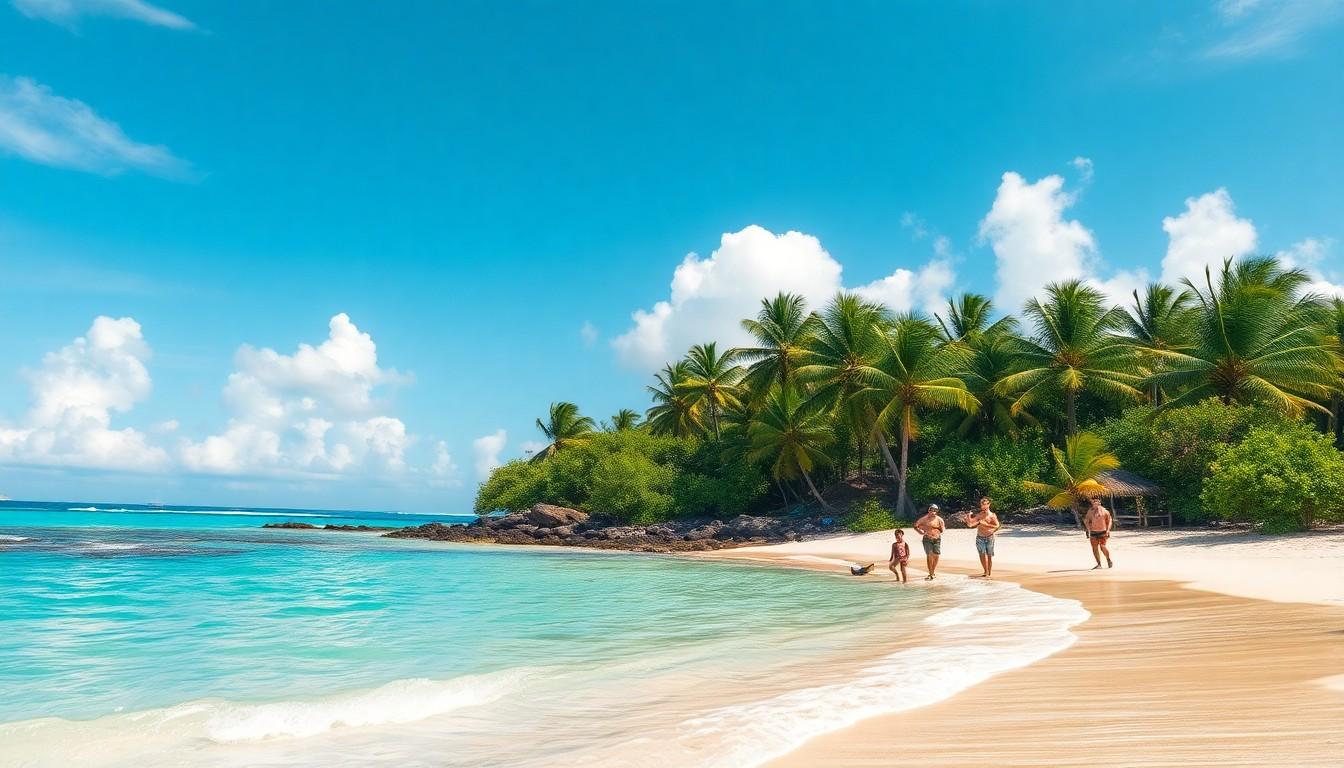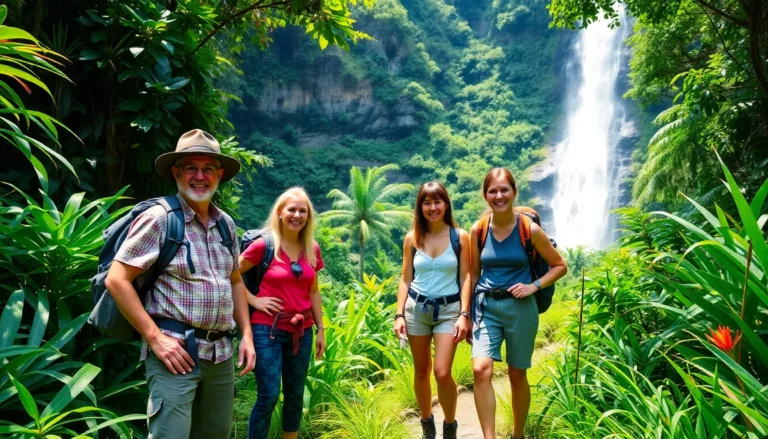Picture this: turquoise waters, lush jungles, and a vibrant culture that makes you want to dance like nobody’s watching. Welcome to Caribbean eco-tourism, where adventure meets sustainability in the most delightful way. Travelers aren’t just soaking up the sun; they’re diving into a world where every beach day doubles as a conservation effort.
caribbean eco-tourism
Caribbean eco-tourism encompasses environmental conservation and sustainable travel within the vibrant region. Travelers immerse themselves in exploring diverse ecosystems, from coral reefs to rainforests. Many destinations feature eco-friendly accommodations, encouraging responsible tourism practices.
Adventure plays a major role in Caribbean eco-tourism. Activities such as hiking through pristine jungles, snorkeling in clear waters, and bird watching attract eco-conscious travelers. Communities benefit economically from responsible tourism while maintaining cultural heritage and environmental integrity.
Tour operators focus on minimizing ecological footprints. They offer tours that highlight the importance of preserving natural resources, such as native flora and fauna. Engaging with local conservation projects often enriches visitor experiences and fosters a deeper appreciation for the environment.
Sustainability is a crucial aspect of Caribbean eco-tourism. Practices such as using solar energy and reducing single-use plastics contribute to environmental protection. Tourists actively support initiatives aimed at reef restoration and wildlife conservation.
The Caribbean region’s natural beauty enhances experiences for eco-tourists. Some islands, like Dominica and St. Lucia, boast unique biodiversity, attracting adventure seekers and nature lovers. This blend of natural wonders and responsible practices positions Caribbean eco-tourism as a growing trend.
Caribbean eco-tourism offers an engaging way for travelers to connect with nature while promoting sustainability. Through these efforts, the region aims to cultivate a balance between tourism and environmental preservation.
Benefits Of Caribbean Eco-Tourism

Caribbean eco-tourism offers multiple advantages for the environment and local economies. Engaging in eco-tourism helps protect fragile ecosystems while supporting communities.
Environmental Impact
Activities related to Caribbean eco-tourism significantly promote conservation efforts. Tour operators implement practices that reduce waste and environmental damage. Travelers often participate in coral reef restoration or wildlife monitoring, actively contributing to ecological preservation. Many resorts utilize renewable energy, minimizing their carbon footprints. Local flora and fauna receive protection through regulated access to natural sites. Communities benefit from education on sustainability, fostering a deeper understanding of their environments.
Economic Contributions
Caribbean eco-tourism contributes substantially to local economies. It generates jobs through eco-friendly tours and accommodations. Many destinations experience increased revenue, allowing for reinvestment into conservation projects. Visitors contribute to the preservation of culture by supporting local artisans and businesses. Economic benefits extend to infrastructure development, enhancing community services. Sustainable practices ensure that resources maintain their value for future generations, establishing a long-term economic strategy for the region.
Popular Destinations
Several Caribbean destinations stand out for their eco-tourism offerings. Each location presents unique opportunities for travelers seeking adventure and sustainability.
Belize
Belize captivates with its Barrier Reef, the second-largest coral reef system globally. Snorkeling and diving here reveal vibrant marine life, attracting eco-conscious adventurers. Rainforests abound, providing habitats for rare wildlife. Visitors often explore the Cayo District, where eco-friendly lodges promote conservation. Many tour operators offer guided hikes and wildlife tours, ensuring minimal environmental impact. Belize actively participates in sustainable initiatives, supporting local communities through eco-tourism dollars.
Costa Rica
Costa Rica is renowned for its commitment to sustainability and biodiversity. Travelers discover lush rainforests, volcanic landscapes, and pristine beaches rich with flora and fauna. Numerous national parks and reserves encourage exploration, with opportunities for bird watching and zip-lining. Eco-lodges offer accommodations that harmonize with nature, utilizing renewable energy sources. Engaging in conservation projects enhances visitors’ experiences, creating a profound connection with the environment. The country prioritizes eco-tourism, making it a top choice for nature lovers.
The Bahamas
The Bahamas boasts stunning marine ecosystems and crystal-clear waters. Numerous islands offer eco-tourism experiences that highlight their natural beauty. Travelers can explore the Exuma Cays, known for their vibrant coral reefs and rich marine life. Sustainable resorts along the coastline promote responsible tourism practices. Kayaking, snorkeling, and nature tours immerse visitors in the rich biodiversity of this region. The Bahamas embraces eco-friendly initiatives that protect its unique habitats and support local communities, enhancing the eco-tourist experience.
Activities In Caribbean Eco-Tourism
Caribbean eco-tourism offers diverse activities that immerse travelers in nature while promoting sustainability. Engaging in these activities supports local communities and contributes to ecological preservation.
Nature Reserves
Nature reserves across the Caribbean showcase the region’s unique biodiversity. Travelers explore lush rainforests and coastal ecosystems while encountering various plant and animal species. Dominica’s Morne Trois Pitons National Park features hiking trails that lead to breathtaking waterfalls and volcanic landscapes. Tourists often enjoy bird-watching in Trinidad and Tobago’s Forest Reserves, home to numerous endemic species. Many reserves include educational programs that inform visitors about conservation efforts. Conservationists regularly conduct guided tours, allowing travelers to witness the incredible ecosystems firsthand. Each visit to these reserves enhances appreciation for the environment and reinforces the importance of sustainable practices.
Wildlife Tours
Wildlife tours in the Caribbean provide unforgettable experiences with the region’s vibrant fauna. Travelers participate in excursions to observe sea turtles nesting in Barbados or explore the mangroves of Jamaica to spot unique bird species. Guided tours often focus on responsible wildlife viewing, ensuring minimal disturbance to natural habitats. Operators frequently share insights on local conservation initiatives, fostering greater understanding among participants. Snorkeling tours at coral reefs let visitors witness marine life while encouraging awareness of reef protection. Many companies incorporate citizen science into their programs, allowing travelers to contribute to ongoing research. Each wildlife tour creates lasting memories and promotes awareness of the need for conservation efforts.
Challenges Facing Caribbean Eco-Tourism
Caribbean eco-tourism faces several significant challenges that threaten its sustainability and efficacy. Addressing these obstacles is crucial to preserving the region’s natural beauty and cultural heritage.
Climate Change
Climate change poses a severe threat to Caribbean eco-tourism. Rising sea levels jeopardize coastal ecosystems and communities. Increased hurricanes and severe weather patterns disrupt travel and increase repair costs for eco-friendly accommodations. Coral reefs, vital for tourism, suffer from ocean warming, leading to bleaching events. Biodiversity loss occurs as habitats change or disappear, impacting wildlife that tourists seek to observe. Mitigating these effects requires coordinated efforts toward environmental conservation and community resilience.
Over-Tourism
Over-tourism deteriorates the authenticity and sustainability of eco-tourism across the Caribbean. Crowded attractions lead to habitat degradation and pollution, adversely affecting local ecosystems. Popular destinations struggle with infrastructure strains as visitor numbers increase rapidly. Local communities often face challenges related to noise and waste management from excessive tourist activity. Emphasizing responsible travel through initiatives like visitor caps and education can help alleviate these concerns, ensuring eco-tourism aligns with environmental preservation.
enjoy breathtaking destinations
Caribbean eco-tourism stands as a powerful model for sustainable travel that benefits both the environment and local communities. By engaging in responsible tourism practices, travelers can explore the region’s stunning natural landscapes while contributing to conservation efforts. The blend of adventure and sustainability not only enhances the travel experience but also fosters a deeper appreciation for the unique ecosystems that the Caribbean has to offer. Addressing the challenges posed by climate change and over-tourism will be crucial in ensuring that future generations can enjoy these breathtaking destinations. As eco-tourism continues to grow, it holds the promise of preserving the Caribbean’s natural beauty for years to come.




